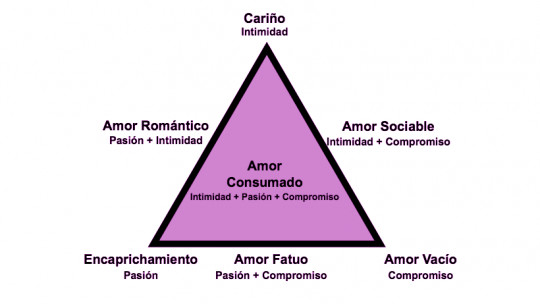He platonic love It is a concept widely used today when we want to refer to a romantic longing to remain united with an unattainable person However, the term has its origins in a very old philosophical theory that is difficult to cover in a single sentence.
Recovering some of the key ideas of what love was for Plato can serve to remind us of a very useful lesson.
What do we understand today by platonic love?
Plato was not so egocentric as to give his name to one of his contributions to philosophy. The term “platonic love” It was first coined by the Renaissance philosopher Marsilio Ficino and it is very difficult that when we refer to this concept we use it with the same exactness with which Plato used it, since both our context and our way of thinking are very different from what was common in Athens more than 2000 years.
However, This concept is usually used to refer to an impossible love for different reasons. It can be a reciprocated love, in which the person in love sees his attempts to get closer to someone frustrated, or it can also serve to refer to those cases in which at the moment in which someone is conquered, this person stops seeming perfect to us. , so that what attracted us to it in the first place is never achieved.
In any case, to learn to reflect on what we experience when we fall into this type of love, it doesn’t hurt to remember some of the main aspects of what platonic love really means.

Keys to understanding platonic love
What exactly are we talking about when we refer to this type of love? Through these four points we are going to try to explain it.
1. Platonic love is “true love”
For Plato, The types of love that are based on the pleasures that our senses provide us are rather banal forms of affection Platonic love is the purest form of love because it is not based on an exchange of physical or material qualities. It is also because, in addition to being disinterested, he never lets us access what we love.
More about the different ways in which humans express this feeling:
2. Platonic love is never achieved
According to the concept of platonic love, beauty has divine essence , and therefore can never be reached by humans. So how does Plato talk about love in such positive and optimistic terms? The answer is that, for the philosopher, love drives us to improve ourselves to be closer to the desired beauty and this is a good thing in itself.
In short, the existence of what we know today as platonic love means that there is something in us that can drive us towards self-perfection. A paradox arises: we fight to get closer to something that, by definition, is inaccessible and infinitely far from us.
For Plato, asking questions about the nature of things through philosophy It is a clear example of what it means to seek unfathomable beauty Wise people are also those who, like Socrates, seek knowledge while accepting their own ignorance. In that harmony is the ennoblement of the soul and the virtue that Plato speaks of.
3. Platonic love is universal
Platonic love does not consist of attraction towards a specific person whom we have idealized. It is rather, a force that seeks us to find the essence of beauty in its different expressions What matters is the divinization of beauty and goodness, concepts that for Plato are linked to each other. For this philosopher, we do not fall in love with people, but with the traces of beauty that we can find in them.
This explains why, paradoxically, beauty is unattainable but also omnipresent. Plato believed that the world that we experience through the senses expresses two realities: a material one, in which everything that is perceived directly through the senses is found, and another ideal, in which the essence of beauty is found. . This explains why we can find the essence of beauty in all imaginable places and people, depending on the degree to which our virtue allows us to glimpse the ideal world in the materiality that surrounds us.
Therefore, if we obey what platonic love is, To believe that a person is perfect is, in reality, to find in that person forms of expression of a beauty that does not belong directly to them nor is it exclusively in them Every time we see perfection in something or someone, we are glimpsing the same thing.
4. Expresses himself intellectually
Platonic love is a type of love that, for the Greek philosopher, manifests itself in a way that is not exclusively physical, since it refers to an object of desire that is beyond the material. This is not limited to being an ethical standard of behavior on how to treat the loved one, but has to do with the very conception of what beauty is for Plato. The beautiful is inseparable from the good and the authentic, and the authentic can only be recognized through the intellect
Likewise, the beauty we find in a body is actually beauty that belongs to the spiritual plane. For Plato, someone who experiences this type of love longs for spiritual access to the object of his desire.
Guide to loving in modern times
In practically all cases in which we talk about platonic love, there is one factor that must be taken into account: the idealization For Plato, love is found in a balance between what is known and what is unknown, and this rule can also be applied to our relationship with people. This is because, When we idealize a person, we are perceiving them as a practically perfect being precisely because we do not know them well enough to see that it is not.
Now, if the essence of what is beautiful is unattainable, specific people are not so. Impossible love can stop being impossible when, for one reason or another, there comes a point where we can “conquer” that person… and that allows us to get to know them more. A question then appears: Is the end of impossible love the end of platonic love?
Idealize… or live love despite its bad things
Not really. For Plato, the attraction we feel for a person always goes beyond the physical, and therefore spending more time with them and Discovering its different facets does not have to mean that we “domesticate” the essence of the beautiful that we find in this There will be something in this person that will continue to be unattainable, although we will not be able to say why, since we still do not understand and intellectually conquer what attracts us.
But this type of persistent idealization is not the most common nowadays.
Is he your platonic love or simply someone inaccessible to you?
Beyond what was understood by platonic love in ancient Greece, idealizing someone usually consists of ignoring that person not because of their ability to continue to remain attractive no matter what, but because of our difficulties in connecting with it either because we have only recently known her or because she only lets us see one of her facets.
The latter becomes evident, for example, in the phenomenon fanboy either fangirl that world famous people have created. Celebrities have such a massive marketing machine behind them and such efficient image consultants that we only know the most attractive and admirable part of their person. To a lesser extent, The same thing happens with people who, despite attracting us because of their appearance, never fully connect with us
Curiously, it is aesthetics and the material, that which was least important for Plato, that leads us to idealize our neighbor: almost never an intellectual approach. Perhaps it would be useful for us to think more often about this fact.









